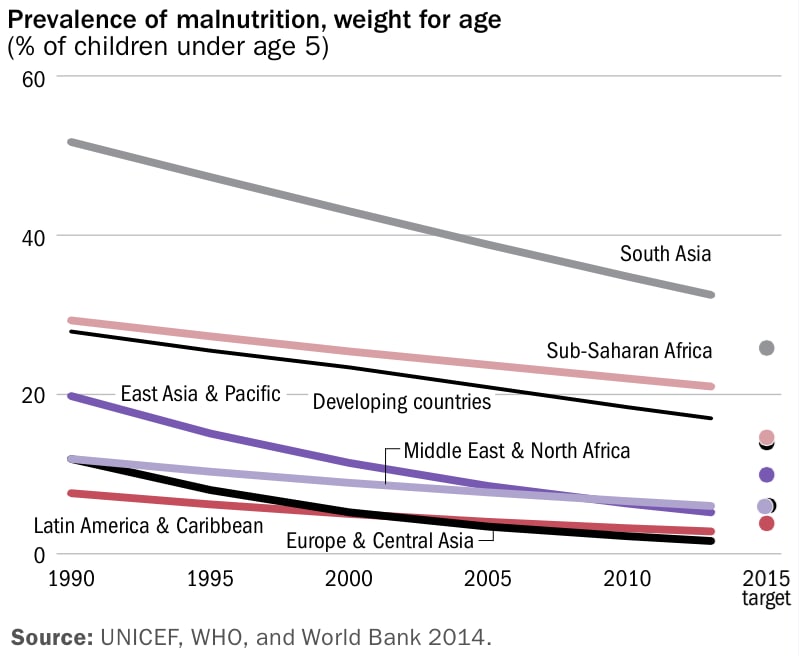Four problems that biotechnology can help solve

Image: REUTERS/Erik De Castro

Get involved with our crowdsourced digital platform to deliver impact at scale
Stay up to date:
Future of Global Health and Healthcare
Many of the problems facing humanity are the same recurring challenges that man has tackled for centuries. Hunger, disease, the need for raw materials, and pollution have limited humanity since prehistoric times. However, throughout history the development of new technologies has enabled dramatic improvements in our quality of life.
Modern molecular biotechnology, or the application of our knowledge of the genome to engineer organisms with beneficial traits, enables new solutions to today’s challenges. Today, the Fourth Industrial Revolution, which adds the tools of molecular biotechnology to humanity’s toolbox, promises similar improvements in wellbeing as those that were delivered by previous technological innovations. Utilizing every available technology is crucial as we strive as a species to support higher populations with fewer resources.
But public fear of biotechnology, in spite of the tremendous advances it has already provided, may prevent these innovations from having the impact they promise. The biotechnology industry must substantially increase its efforts to educate and engage the public to ensure that biotechnology truly lives up to its potential.
1. Feeding the next billion
Industrial farming and food production have prompted dramatic shifts in the world economy, and fewer than 5% of developed countries’ populations now work in agriculture. But the World Bank predicts that we will need to produce yet another 50% more food by 2050 while climate change may reduce productivity by 25%.

Simply dedicating more land to agriculture is one potential solution, but may result in food production far from the areas of greatest need. Increases in productivity per acre, drought resistant crops, and decreases in the need for chemical fertilizers would all go far to sustainably achieving the food production the world will need, reducing pressure to transform lush forests into agricultural land.
Biotechnology companies such as Indigo Agriculture are employing microbes which can make crops more productive and tolerant of environmental stress, helping to feed the next billion people. In addition, drought resistant crops are being developed by Pioneer, Syngenta, and Monsanto. Foods can also deliver enhanced nutrition, such as Golden Rice with additional vitamin A from the International Rice Research Institute.
2. Tackling disease
Some of the first applications of genetic engineering were in the pharmaceutical industry, helping to treat medical conditions and diseases. Insulin, synthesized with biotechnology, avoided the use of insulin isolated from pigs, to which some patients are allergic. Other treatments created by biotechnology include interferon therapy to trigger one’s immune system, human growth hormone, and the hepatitis B vaccine.
Yet, in spite of this tremendous progress in modern medicine, today we face scary prospects, including the spread of the Zika virus and the rise of antibiotic-resistant bacteria. Biotechnology offers some of the most promising and targeted ways to find solutions to these threats. For example, the British company Oxitec, a subsidiary of Intrexon Corporation, offers a technology to control the spread of a single species of insect, Aedes aegypti, the primary vector for dengue, chikungunya and Zika virus outbreaks around the world. And many researchers are investigating the use of CRISPR/Cas gene-editing technology as a new method of controlling antibiotic-resistant microorganisms.
3. Cleaning up pollution
Glacial records have shown us that, as long as 2,500 years ago, roman-era metal production was a source of global pollution. The streets of London and other cities were polluted by coal and wood fires, as well as by the horses used as transportation. Today, our pollution challenges appear more subtle, but surely technologies will also turn them into anachronisms.
One company, PIARCS, PBC has a new biotechnology to resolve phosphorous in wastewater treatment plants, our own company Universal Bio Mining is developing enzymes capable of degrading chemical residue of petroleum production in the oil sands industry, and Carbios of France is developing a technique to recycle the ubiquitous PET plastic used in our disposable packaging.
4. Harnessing scarce natural resources
The availability of natural resources has always been a constraint and a source of international tension. As easy to reach and process metal deposits are depleted, the mining industry must double the amount of earth it removes from the ground every eight years. In another example, clean fresh water is expected to become one of the greatest sources of international conflict during the 21st century, as people battle over the control of rivers and underground water sources.
Here, again, biotechnology offers new tools to soften or resolve these challenges. Our company, Universal Bio Mining, is developing new processes to extract copper and gold from ores that are currently uneconomic, and start-up companies such as CustoMem from Imperial College of London have created water filters utilizing proteins to filter polluted waters.
The future of biotech
Advances in technology have dramatically increased the rates at which these new biotechnologies can be developed, while at the same time, reducing the cost of development. Gene sequencing and synthesis technologies have dropped precipitously in price, allowing innovators to develop their inventions much faster, and at a lower cost.
However, challenges remain. Regulatory roadblocks make it difficult for small biotech innovators to set up laboratories, and the path to regulatory approval for some technologies remains unclear, discouraging investment.
But most importantly, public fear of these new tools often prevents them from turning into commercial products. For example, the Golden Rice product, announced in 2000 to reduce Vitamin A deficiency that kills 600,000 children per year, has yet to be grown commercially.
The challenges facing humanity remain significant and society simply cannot let these potential solutions be ignored.
The biotechnology industry must continue to educate the public, regulators, and other industries about the potential of the sector. This means actively participating in the development of regulatory processes for these evolving technologies, inviting conversations with all stakeholders, and ensuring the public understands both the technology and the benefits that it delivers.
With time, the public will ask, “Why hasn’t biotechnology solved this problem yet?”
For more information on the Technology Pioneers 2016, visit our website.
Don't miss any update on this topic
Create a free account and access your personalized content collection with our latest publications and analyses.
License and Republishing
World Economic Forum articles may be republished in accordance with the Creative Commons Attribution-NonCommercial-NoDerivatives 4.0 International Public License, and in accordance with our Terms of Use.
The views expressed in this article are those of the author alone and not the World Economic Forum.
The Agenda Weekly
A weekly update of the most important issues driving the global agenda
You can unsubscribe at any time using the link in our emails. For more details, review our privacy policy.
More on Nature and BiodiversitySee all
Dan Lambe
April 24, 2024
Roman Vakulchuk
April 24, 2024
Charlotte Kaiser
April 23, 2024
Jennifer Holmgren
April 23, 2024
Agustin Rosello, Anali Bustos, Fernando Morales de Rueda, Jennifer Hong and Paula Sarigumba
April 23, 2024
Carlos Correa
April 22, 2024






